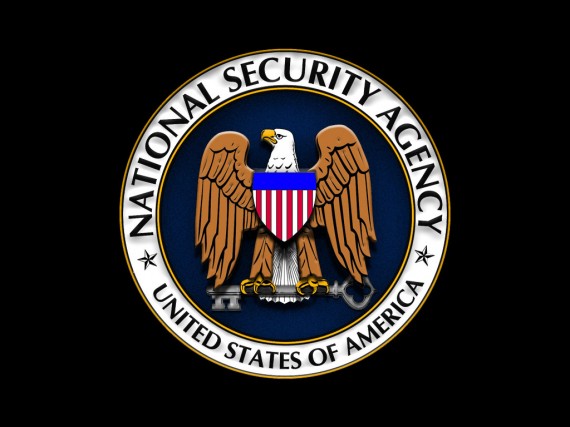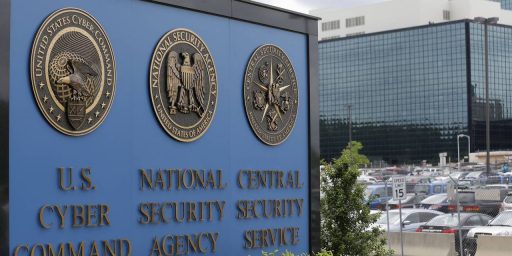House Passes Bill To Restrict N.S.A. Data Mining
The House has passed a bill that would place real restrictions on the National Security Agency's data mining program. Now, it moves to the Senate.
Yesterday, the House of Representatives passed a bill that seeks to significantly modify the powers granted to the National Security Agency and other agencies by the PATRIOT Act, but it fell short of what some reformers wanted and its future in the Senate is far from certain:
WASHINGTON — The House on Wednesday overwhelmingly approved legislation to end the federal government’s bulk collection of phone records, exerting enormous pressure on Senator Mitch McConnell of Kentucky, the Senate majority leader, who insists that dragnet sweeps continue in defiance of many of those in his Republican Party.
Under the bipartisan bill, which passed 338 to 88, the Patriot Act would be changed to prohibit bulk collection by the National Security Agency of metadata charting telephone calls made by Americans. However, while the House version of the bill would take the government out of the collection business, it would not deny it access to the information. It would be in the hands of the private sector — almost certainly telecommunications companies like AT&T, Verizon and Sprint, which already keep the records for billing purposes and hold on to them from 18 months to five years.
So for the N.S.A., which has been internally questioning the cost effectiveness of bulk collection for years, the bill would make the agency’s searches somewhat less efficient, but it would not wipe them out. With the approval of the Foreign Intelligence Surveillance Court, the spy agencies or the F.B.I. could request data relevant to an investigation. Corporate executives have said that while they would have to reformat some data to satisfy government search requirements, they could most likely provide data quickly.
The legislation would also bar bulk collection of records using other tools like so-called national security letters, which are a kind of administrative subpoena.
The near unanimity in the House is not reflected in the Senate, where a bipartisan group that backs the House bill faces opposition from Mr. McConnell and a small but powerful group of defense hawks who want no change, and from another faction led by Senator Rand Paul, Republican of Kentucky, that is pressing for even greater restrictions of data collection.
A compromise of some form must be reached before June 1, when the provision of the Patriot Act that allows the N.S.A. dragnet expires.
“I think we have found an equilibrium on how to protect both security and privacy,” said Representative Adam B. Schiff of California, the ranking Democrat on the House Intelligence Committee. “These issues are not going away. I think the fact that the public is becoming much more united on how we balance these dual imperatives has ripened in a very constructive way.”
The debate over the issue, which intensified after the surveillance efforts were exposed by Edward J. Snowden, was complicated by a federal appeals court ruling last week that found the National Security Agency’s bulk collection of phone records illegal, and by the coming expiration of the Patriot Act at the end of the month.
Some strong critics of the N.S.A. have been critical of the bill that the House passed because, while does bring an end to the mass collection of private metadata by the government itself, it does tend to codify agency practices that have been sharply criticized by many, including most recently the Second Circuit Court of Appeals. Several of these critics have argued in favor of the idea of stripping this type of power from the N.S.A. entirely, rather than simply changing the current practice to have the metadata held in the hands of private companies and the N.S.A. required to get warrants in order to gain access to the information. While these concerns are well-founded, and in an ideal world the PATRIOT Act would be repealed in its entirety, it’s also quite apparent that this is not a realistic possibility at the present time. Some kind of bill reauthorizing the law is most likely going to be passed before the end of the month, that much is clear. Given that, it strikes me that a bill that places some restrictions on the N.S.A.’s ability to spy on American citizens by at least requiring them to get court permission before being able to access data is a positive development.
That being said, the bill itself faces an interesting and uncertain future in the Senate, where it will be debated amid the backdrop of a race for the Republican nomination that includes three of the Senate’s more outspoken members, and the leader of the Senate believes that the bill that passed the House places too many restrictions on law enforcement:
In a demonstration of the complexity of the dynamics among Republicans, three of the party’s contenders for the White House hold disparate positions on the bill.
Mr. McConnell has proclaimed that the legislation that passed the House, with strong support from Speaker John A. Boehner, “will neither keep us safe nor protect our privacy.”
However, it is clear that Mr. McConnell, whose efforts to advance President Obama’s trade agenda fell flat this week on a procedural vote, does not have enough support in the Senate to pass a straight reauthorization of the Patriot Act. The House bill, however, could well have a filibuster-proof majority in the Senate.
“We have an obligation to protect the constitutional rights of every American,” said Senator Ted Cruz, Republican of Texas. “The USA Freedom Act ends the federal government’s bulk collection of phone metadata from millions of law-abiding citizens. That’s the right thing to do.”
(…)
Among the likely Republican presidential contenders, while Mr. Cruz favors the bill passed by the House, Senator Marco Rubio of Florida supports Mr. McConnell’s approach. Mr. Paul said the reform bill did not go far enough, a position now posited by some privacy groups in light of the court decision.
Because of this, the debate in the Senate over the coming weeks is likely to be tied up in Presidential politics even more than it might otherwise be. Senator Paul will double down on his opposition to the PATRIOT Act as a whole, and indeed has even threatened to stage a filibuster against the bill, although it’s unlikely he could actually hold the bill up very long if McConnell and the rest of the Senate GOP wants it to move forward. Even if it doesn’t succeed, though, Paul’s efforts here will likely boost his campaign by energizing supports and putting issues that he clearly believes help his campaign at the front of the political discussion. Marco Rubio and Ted Cruz, on the other hand, will use the debate as an opportunity to shore up their national security bona fides. As I said, in the end, the bill that passed the House will, in all likelihood, pass the Senate in something closely resembling its current form. While it’s far from perfect, it’s certainly better than the status quo, and that’s a good step forward.







According to the EFF it’s a weaker, “less robust” version of the bill the President backed and Republicans filibustered in the lame duck session last year:
https://www.eff.org/deeplinks/2015/04/new-usa-freedom-act-step-right-direction-more-must-be-done
EFF supports passing this new bill too (as it’s the best they’re going to get with the current makeup of congress).
That would be a positive development if the court they need to convince didn’t have a 99.97% approval rate of these sorts of requests in the past.
There needs to be limits on government collection of personal data in many agencies. Take a look at the so-called “Affordable Healthcare Act” which is administered of course by the IRS. Think about all that information that your doctor is gathering about you and entering it into a laptop. Then who all gets access to it ? And the questions: people are being asked if they own a gun, how much tv do they watch and other nosy, irrelevant questions. My doctor asked questions about my parents’ health. They aren’t the ones in there getting treatment ! Weird !
It is well known that some of these search engine companies are tied in with the government.
The last group we need having our medical information is the IRS !